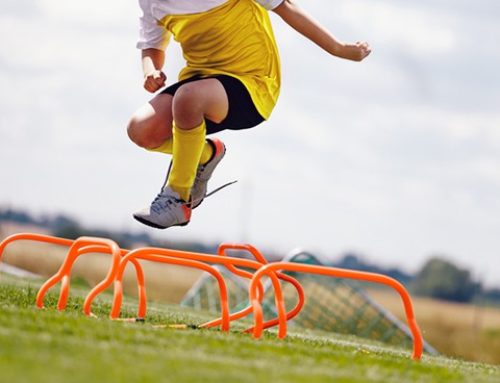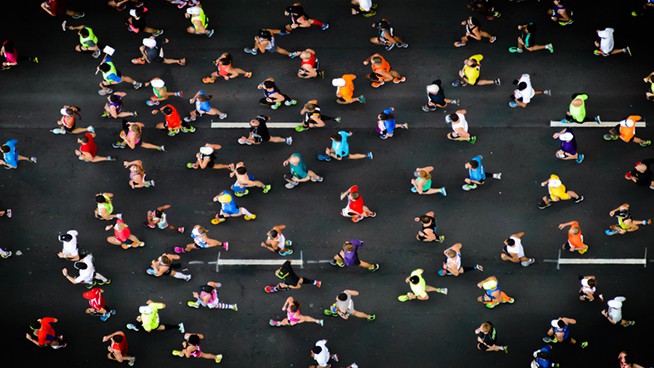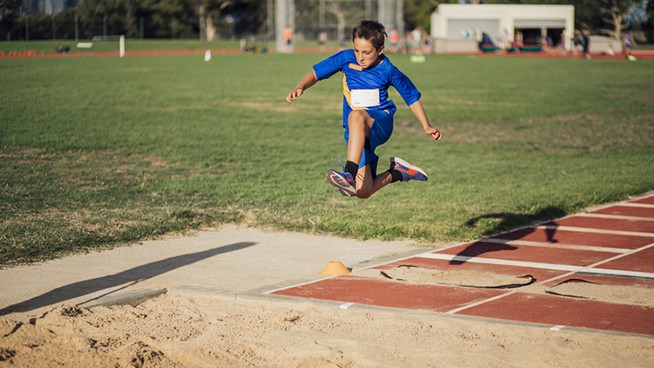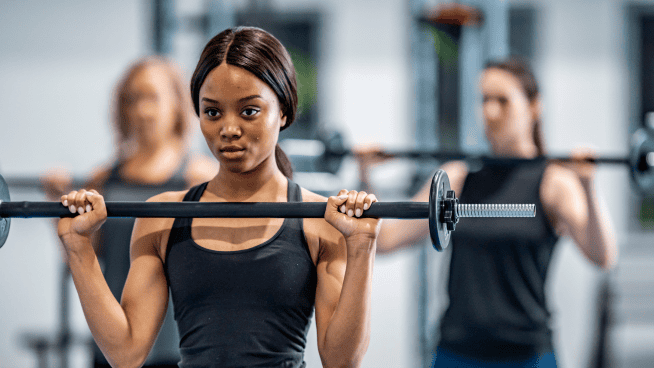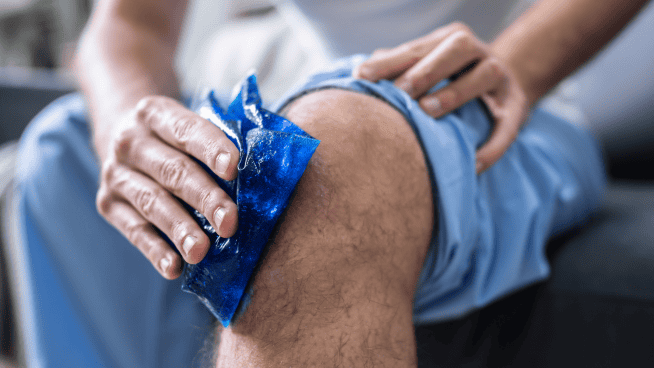NCAA Nutrition Regulations Hamper Student-Athletes on the Field and in the Classroom
One of the most important and unexpected challenges for college athletes, especially freshmen, is eating properly. It is no easy task, since the demands of daily training give student-athletes much higher food and fluid needs than the average college student. Studies show that some college athletes need between 4,000 and 5,000 calories per day, compared to 1,500 to 3,000 for the typical student. Eating the right food at the right time is vital for enabling student-athletes to train, compete, recover and heal, as well as to think and learn. But with schedules packed with practices (sometimes two a day), classes, group study and team meetings, college athletes have limited windows of time for getting the nutrition they need.
Today’s college athlete nutrition guidelines were issued by the NCAA in 1991. They allow schools to feed their athletes only one training table meal per day, five days each week. Programs are also limited in the types of fuel they can provide during and after training sessions. The NCAA rules were initially intended to curb practices like taking athletes out to expensive restaurants and providing supplements with little regard for safety or effectiveness. In the 22 years since the rules have been in effect, our knowledge of sports nutrition has grown exponentially, including several studies showing that college athletes have a difficult time meeting their nutritional needs. A 2013 study of 52 Division I female athletes found that 74 percent did not meet the minimum mark for carbohydrate intake, and half were not eating sufficient protein.
This problem affects athletes both on and off the field. College athletes who have poor diets are at a greater risk of injury. They experience increased feelings of fatigue. There are indications that they are more likely to turn to supplements or performance enhancing drugs when adequate nutrition is not available. The continued growth of muscles, bones and brains are all strongly influenced by nutrition—and, not surprisingly, so is cognitive performance.
Teo D’Alessandro, a record-breaking All-Ivy League swimmer from Princeton University, explained the challenges he faced in eating properly as a student-athlete. He said, “The transition from high school to college was difficult. Adjusting to the rigors of competition and academics at this level was a challenge, and a major barrier has been getting enough calories during and right after practice. I think it is difficult for coaches and athletes to always have the fuel our bodies need nearby when we need it. Hopefully, in the next few years, we will be able to have access to food on a regular basis.”
Mitch Dalton, D’Alessandro’s coach and the assistant coach for Princeton’s Men’s Swimming and Diving team, recognizes the importance of nutrition for performance. He works within the current NCAA nutrition restrictions to fuel his athletes properly following their toughest workouts. But because the current rules don’t allow for any whole foods other than fruit, bagels and nuts, he often has to rely on bars and sports drinks.
The NCAA will vote early in 2014 on changing its rules to allow colleges and universities greater freedom to meet the nutrition needs of their student-athletes. But for now, all Division I programs must adhere to the dated regulations. Until change is enacted, it’s important for college athletes to recognize some of the challenges they face in eating right, so that they can overcome them with solid nutrition strategies.
Hey! Why is the fridge empty?
At college, no one but you is responsible for keeping your refrigerator stocked with healthy foods and drinks—if you’re lucky enough to have a refrigerator in the first place. And no one will load your cupboard with your favorite snacks unless you do it yourself.
What’s in this sauce?
Most college dining halls serve an incredible variety of foods, some of which are prepared in ways that are different from what you’re used to at home. Also, you might not be used to shopping and cooking for yourself.
How is it already midnight?
You’ll devote 10 to 20 hours each week to sports practices and competitions, a substantial time commitment, considering all the other activities that make up college life. The combination of classwork, studying, rest, sports practice and social events makes for a hectic schedule, offering limited opportunities to just sit down and enjoy eating with friends.
OK, but what should I eat?
All too often, athletes follow the advice of a friend or recommendations gleaned from the internet, only to find themselves struggling during practice and in the classroom because they aren’t consuming enough of the right types of foods to give their bodies the nutrients they need to perform at their best. With so many sources of nutrition advice out there—some far more credible than others—it’s hard to know what to eat, how much and when.
It doesn’t take many days of eating poorly before performance in the classroom and during practice begins to suffer. The poor diets that college athletes often fall into can lead to fatigue and injury. College athletes often have to eat on the go, squeezing in quick meals and snacks between classes, with the luxury of a training table meal only once each day.
So what’s the solution?
Proper nutrition before, during and after training can enhance fitness and recovery. Just as important, well-nourished students are more likely to do better in the classroom. If you are fortunate enough to have access to a sports registered dietitian (RD) at your school, take full advantage of the opportunity to learn as much as you can about how proper nutrition and hydration can help you perform at your peak.
According to Dave Ellis, RD, CSCS, who has spent his career providing nutrition advice to college and professional athletes, “Sports RDs are trained to identify and solve unique challenges when it comes to nutrition and hydration. For example, we’ve all had college athletes in our offices who are disoriented because they simply haven’t eaten frequently enough to maintain their blood sugar levels. This happens because college athletes have less structure and often don’t have the shopping or cooking skills to create wholesome meals.”
At Princeton University, my job as a sports RD is to help athletes learn to fuel in a manner best suited to their specific sports and individual goals. For example, athletes in weight class sports not only need to safely meet their goals, they must do so in a way that optimizes performance and longevity for grueling seasons. This entails a very technical approach, starting with an accurate nutrition and body composition assessment and leading to detailed and individualized eating and recovery plans.
In addition, sports RDs help student-athletes separate fact from fiction. It would be impossible to condense all of their knowledge into a few recommendations, but here are five pieces of advice that every student-athlete should keep in mind.
5 Sports Nutrition Tips for Peak Performance
1. It’s all about energy. Every cell in the body requires energy to function. Active muscles and brain cells require a lot of energy throughout every day to sustain their functions, including cellular growth and repair. A sports RD can help you determine how much energy you need each day to meet the demands of your sport and schoolwork. And getting the right amount of energy is not all that’s important; it’s also getting the right balance of energy from proteins, carbohydrates and fats.
2. Fuel your muscles. Active muscles use the caloric energy from food to fuel their contractions. The carbohydrates and fats in the foods we eat support everyday activities and exercise. Many athletes don’t realize that muscles use fuel that is ingested right before and even during exercise. Consuming a pre-workout snack, like yogurt and fruit, supplies active muscles with energy that can boost performance. This means you’ll be able to perform longer and stay stronger, in practice and competition.
3. Eat regularly throughout the day. It’s easy for busy student-athletes to skip meals and forget to snack during non-stop days that consist of going from a morning practice to a day packed with classes to evening practice and then to study hall. When you don’t get a chance to eat throughout the day, your body tries to catch up at night or at the training table, often leading to overeating. That’s a bad habit for student-athletes, because not eating throughout the day starves their brain and muscles of vital energy when it’s needed most. Access to nutrient-rich foods throughout the day can help athletes fuel, restore, and avoid overeating and back-loading of calories later.
4. Focus on recovery. If you are an athlete, your muscles take a beating each and every day. Hard training depletes the energy stores in muscles and causes muscle damage that must be repaired. Training is a stimulus for your muscles to grow and gain strength—adaptations that depend on good nutrition and eating the right foods at the right time. Immediately after training, your muscles are hungry, making post-workout nutrition extremely important. Milk and other dairy products can provide the ideal nutritional package—high-quality protein to help rebuild muscle and reduce muscle breakdown; carbohydrates to help refuel muscles; fluid and electrolytes to rehydrate and replenish what is lost in sweat after intense training; and vitamins and minerals to help build and maintain strong bones and support overall health. Consuming chocolate milk, a food-based recovery drink, a smoothie, or another healthy snack will help jump-start the recovery process and get your muscles ready to go for the next practice.
5. Food first. Make sure that your nutrition and hydration plans are everything they should be before thinking about taking a dietary supplement. Nutrition and hydration have a much greater impact on your performance than any supplement ever will. A well balanced plate—which includes ample fruits and vegetables, a high quality protein source, dairy foods such as milk, cheese, and yogurt, and better carbohydrates like brown rice, sweet potatoes, or oatmeal—is what fuels your body for performance—not some pill from a bottle.
For more information on sports nutrition for student-athletes, visit State of the Science: Feeding Student-Athletes.
RECOMMENDED FOR YOU
MOST POPULAR
NCAA Nutrition Regulations Hamper Student-Athletes on the Field and in the Classroom
One of the most important and unexpected challenges for college athletes, especially freshmen, is eating properly. It is no easy task, since the demands of daily training give student-athletes much higher food and fluid needs than the average college student. Studies show that some college athletes need between 4,000 and 5,000 calories per day, compared to 1,500 to 3,000 for the typical student. Eating the right food at the right time is vital for enabling student-athletes to train, compete, recover and heal, as well as to think and learn. But with schedules packed with practices (sometimes two a day), classes, group study and team meetings, college athletes have limited windows of time for getting the nutrition they need.
Today’s college athlete nutrition guidelines were issued by the NCAA in 1991. They allow schools to feed their athletes only one training table meal per day, five days each week. Programs are also limited in the types of fuel they can provide during and after training sessions. The NCAA rules were initially intended to curb practices like taking athletes out to expensive restaurants and providing supplements with little regard for safety or effectiveness. In the 22 years since the rules have been in effect, our knowledge of sports nutrition has grown exponentially, including several studies showing that college athletes have a difficult time meeting their nutritional needs. A 2013 study of 52 Division I female athletes found that 74 percent did not meet the minimum mark for carbohydrate intake, and half were not eating sufficient protein.
This problem affects athletes both on and off the field. College athletes who have poor diets are at a greater risk of injury. They experience increased feelings of fatigue. There are indications that they are more likely to turn to supplements or performance enhancing drugs when adequate nutrition is not available. The continued growth of muscles, bones and brains are all strongly influenced by nutrition—and, not surprisingly, so is cognitive performance.
Teo D’Alessandro, a record-breaking All-Ivy League swimmer from Princeton University, explained the challenges he faced in eating properly as a student-athlete. He said, “The transition from high school to college was difficult. Adjusting to the rigors of competition and academics at this level was a challenge, and a major barrier has been getting enough calories during and right after practice. I think it is difficult for coaches and athletes to always have the fuel our bodies need nearby when we need it. Hopefully, in the next few years, we will be able to have access to food on a regular basis.”
Mitch Dalton, D’Alessandro’s coach and the assistant coach for Princeton’s Men’s Swimming and Diving team, recognizes the importance of nutrition for performance. He works within the current NCAA nutrition restrictions to fuel his athletes properly following their toughest workouts. But because the current rules don’t allow for any whole foods other than fruit, bagels and nuts, he often has to rely on bars and sports drinks.
The NCAA will vote early in 2014 on changing its rules to allow colleges and universities greater freedom to meet the nutrition needs of their student-athletes. But for now, all Division I programs must adhere to the dated regulations. Until change is enacted, it’s important for college athletes to recognize some of the challenges they face in eating right, so that they can overcome them with solid nutrition strategies.
Hey! Why is the fridge empty?
At college, no one but you is responsible for keeping your refrigerator stocked with healthy foods and drinks—if you’re lucky enough to have a refrigerator in the first place. And no one will load your cupboard with your favorite snacks unless you do it yourself.
What’s in this sauce?
Most college dining halls serve an incredible variety of foods, some of which are prepared in ways that are different from what you’re used to at home. Also, you might not be used to shopping and cooking for yourself.
How is it already midnight?
You’ll devote 10 to 20 hours each week to sports practices and competitions, a substantial time commitment, considering all the other activities that make up college life. The combination of classwork, studying, rest, sports practice and social events makes for a hectic schedule, offering limited opportunities to just sit down and enjoy eating with friends.
OK, but what should I eat?
All too often, athletes follow the advice of a friend or recommendations gleaned from the internet, only to find themselves struggling during practice and in the classroom because they aren’t consuming enough of the right types of foods to give their bodies the nutrients they need to perform at their best. With so many sources of nutrition advice out there—some far more credible than others—it’s hard to know what to eat, how much and when.
It doesn’t take many days of eating poorly before performance in the classroom and during practice begins to suffer. The poor diets that college athletes often fall into can lead to fatigue and injury. College athletes often have to eat on the go, squeezing in quick meals and snacks between classes, with the luxury of a training table meal only once each day.
So what’s the solution?
Proper nutrition before, during and after training can enhance fitness and recovery. Just as important, well-nourished students are more likely to do better in the classroom. If you are fortunate enough to have access to a sports registered dietitian (RD) at your school, take full advantage of the opportunity to learn as much as you can about how proper nutrition and hydration can help you perform at your peak.
According to Dave Ellis, RD, CSCS, who has spent his career providing nutrition advice to college and professional athletes, “Sports RDs are trained to identify and solve unique challenges when it comes to nutrition and hydration. For example, we’ve all had college athletes in our offices who are disoriented because they simply haven’t eaten frequently enough to maintain their blood sugar levels. This happens because college athletes have less structure and often don’t have the shopping or cooking skills to create wholesome meals.”
At Princeton University, my job as a sports RD is to help athletes learn to fuel in a manner best suited to their specific sports and individual goals. For example, athletes in weight class sports not only need to safely meet their goals, they must do so in a way that optimizes performance and longevity for grueling seasons. This entails a very technical approach, starting with an accurate nutrition and body composition assessment and leading to detailed and individualized eating and recovery plans.
In addition, sports RDs help student-athletes separate fact from fiction. It would be impossible to condense all of their knowledge into a few recommendations, but here are five pieces of advice that every student-athlete should keep in mind.
5 Sports Nutrition Tips for Peak Performance
1. It’s all about energy. Every cell in the body requires energy to function. Active muscles and brain cells require a lot of energy throughout every day to sustain their functions, including cellular growth and repair. A sports RD can help you determine how much energy you need each day to meet the demands of your sport and schoolwork. And getting the right amount of energy is not all that’s important; it’s also getting the right balance of energy from proteins, carbohydrates and fats.
2. Fuel your muscles. Active muscles use the caloric energy from food to fuel their contractions. The carbohydrates and fats in the foods we eat support everyday activities and exercise. Many athletes don’t realize that muscles use fuel that is ingested right before and even during exercise. Consuming a pre-workout snack, like yogurt and fruit, supplies active muscles with energy that can boost performance. This means you’ll be able to perform longer and stay stronger, in practice and competition.
3. Eat regularly throughout the day. It’s easy for busy student-athletes to skip meals and forget to snack during non-stop days that consist of going from a morning practice to a day packed with classes to evening practice and then to study hall. When you don’t get a chance to eat throughout the day, your body tries to catch up at night or at the training table, often leading to overeating. That’s a bad habit for student-athletes, because not eating throughout the day starves their brain and muscles of vital energy when it’s needed most. Access to nutrient-rich foods throughout the day can help athletes fuel, restore, and avoid overeating and back-loading of calories later.
4. Focus on recovery. If you are an athlete, your muscles take a beating each and every day. Hard training depletes the energy stores in muscles and causes muscle damage that must be repaired. Training is a stimulus for your muscles to grow and gain strength—adaptations that depend on good nutrition and eating the right foods at the right time. Immediately after training, your muscles are hungry, making post-workout nutrition extremely important. Milk and other dairy products can provide the ideal nutritional package—high-quality protein to help rebuild muscle and reduce muscle breakdown; carbohydrates to help refuel muscles; fluid and electrolytes to rehydrate and replenish what is lost in sweat after intense training; and vitamins and minerals to help build and maintain strong bones and support overall health. Consuming chocolate milk, a food-based recovery drink, a smoothie, or another healthy snack will help jump-start the recovery process and get your muscles ready to go for the next practice.
5. Food first. Make sure that your nutrition and hydration plans are everything they should be before thinking about taking a dietary supplement. Nutrition and hydration have a much greater impact on your performance than any supplement ever will. A well balanced plate—which includes ample fruits and vegetables, a high quality protein source, dairy foods such as milk, cheese, and yogurt, and better carbohydrates like brown rice, sweet potatoes, or oatmeal—is what fuels your body for performance—not some pill from a bottle.
For more information on sports nutrition for student-athletes, visit State of the Science: Feeding Student-Athletes.


